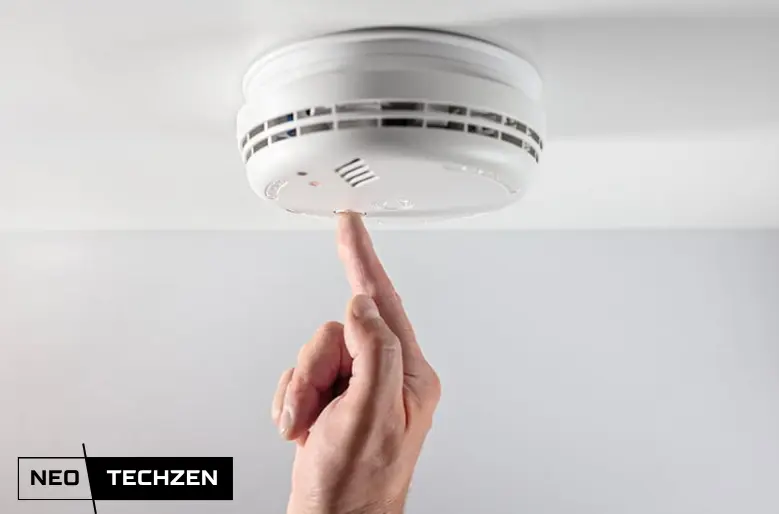Smoke alarm beeping is annoying and for good reason. It’s your alarm screaming for attention. Whether it’s a dying battery or a dusty sensor, you can’t afford to ignore it. In this guide, we’ll explain exactly why your smoke alarm is beeping and how you can silence it fast. No tech talk. No fluff. Just clear steps anyone can follow even if you’re not handy.
Table of Contents
What Does It Mean When a Smoke Alarm Beeps?
When your smoke alarm beeps, it is trying to tell you something. What can it mean here:
- Low Battery – The #1 cause. One chirp every 30–60 seconds.
- Sensor Problem – Dust, bugs, or dirt could be the issue.
- It’s Old – Most alarms expire after 8–10 years.
- Power Failure – Hardwired units beep when they lose power.
Quick Stats:
- 96% of homes in the U.S. have at least one smoke alarm.
- 3 out of 5 fire deaths occur in homes without working smoke alarms.
- Smoke alarms should be tested monthly.
- Batteries should be changed yearly.
Why is my smoke alarm beeping?
Smoke alarm beeping is typically resulting from a low battery, a dirty sensor, an electrical issue, or the alarm reaching the cease of its existence. To restore it, update the battery, ease the unit, reset it, or update it if it is older than 10 years.
How to Stop Your Smoke Alarm from Beeping
Let’s fix the issue in 4 simple steps:
1. Replace the Battery
- Remove the alarm from the base.
- Take out the old battery.
- Put in a fresh 9-volt battery.
- Press the test button.
Even hardwired alarms often have backup batteries.
2. Clean the Sensor
- Use a soft brush or vacuum.
- Gently clean the vents.
- Don’t spray water or use cleaners.
Dust is one of the most common causes of false alarms.
3. Reset the Alarm
- Hold the test/reset button for 15–20 seconds.
- Wait to see if the beeping stops.
4. Check the Manufacture Date
- Look on the back of the unit.
- If it’s older than 10 years, replace the whole alarm.
Newer models have 10-year lithium batteries, no replacement needed.
Types of Smoke Alarm Beeps and Their Meanings
Recognize the sound to know the fix:
- One chirp every 60 seconds: Low battery.
- Three fast beeps: Smoke or fire detected.
- Five beeps per minute: Alarm has expired.
- Constant beep: Emergency get out and call 911.
How to Keep Your Alarm from Beeping in the Future
Prevent problems before they start:
- Test alarms monthly.
- Replace batteries yearly.
- Clean sensors every few months.
- Don’t install alarms near stoves or bathrooms.
Humidity and cooking smoke can set off false alarms.
Fun Facts About Smoke Alarms
- Kids respond faster to voice alerts than standard beeps.
- Ionization alarms are better for fast flames.
- Photoelectric alarms work better for slow, smoldering fires.
- Smart smoke alarms send alerts to your phone.
FAQs:
Why is my smoke alarm still beeping after I changed the battery?
It might need a reset or cleaning. Check for dust or age.
How do I reset a smoke alarm?
Hold the test/reset button for 15–20 seconds.
When should I replace a smoke alarm?
Replace it if it’s over 10 years old.
What do 3 beeps mean?
That usually signals smoke or fire, get out and call 911.
Why does my hardwired smoke alarm beep?
It could be power loss, a loose wire, or a bad backup battery.
Should I replace all alarms at once?
Yes, if they’re the same age or installed together.
Are smart smoke alarms better?
Yes, they alert you via phone and self-test regularly.
What if my smoke alarm beeps when I cook?
Use the hush button and increase ventilation.
Final Thoughts
A beeping smoke alarm isn’t just noise. It’s a warning. Whether it’s a simple battery fix or time for a new device, act now. Following these easy steps could save your life. So next time your smoke alarm beeps, don’t yank it off the ceiling fix it.
Never miss an update! Follow our WhatsApp Channel for exclusive News and Blogs.


